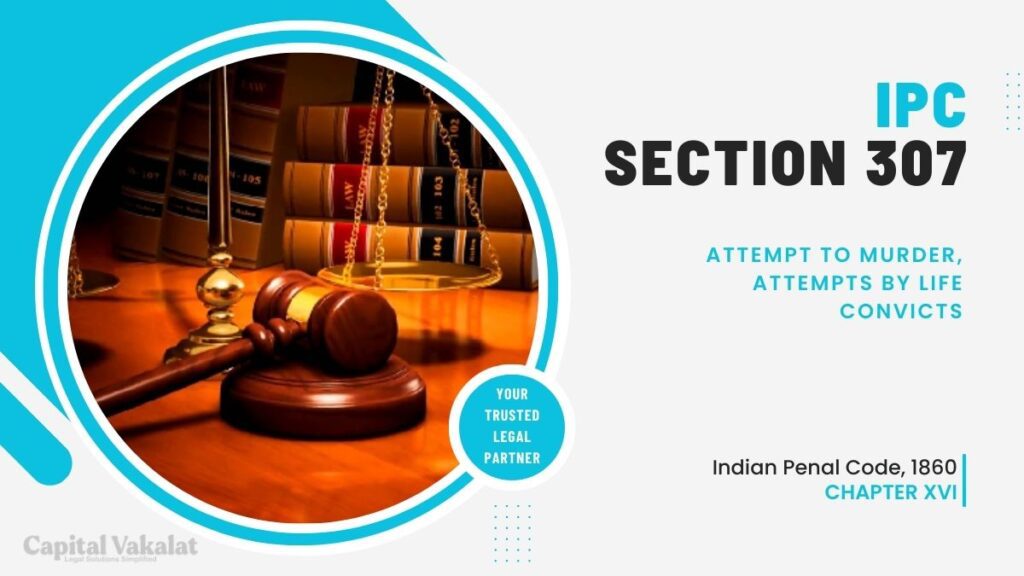In the realm of criminal law in India, Section 307 IPC holds a significant place, dealing with attempts to murder. This provision not only defines the offense but also outlines the graded punishment for those found guilty. The understanding of Section 307 becomes even more intriguing when we delve into cases involving attempts by individuals serving life sentences.

This article aims to explore Section 307 IPC, shedding light on the legal intricacies and psychological aspects surrounding attempts to murder, particularly those committed by life convicts.
Understanding Section 307 IPC
Section 307 of the Indian Penal Code defines and penalizes the offense of attempted murder. It encompasses situations where an individual intentionally tries to cause the death of another person but falls short of completing the act. The elements of the offense include intent, preparation, and a direct act in furtherance of causing death. The punishment for attempt to murder varies depending on the severity of the act and the harm caused.
Legal Implications and Significance
Individuals charged under Section 307 face severe legal consequences. The offense is considered heinous, and the legal system is stringent in dealing with such cases. Legal precedents and case studies play a crucial role in shaping the interpretation and application of this section, highlighting the gravity of the offense and the need for a fair trial.
Attempt to Murder vs. Completed Murder
Distinguishing between an attempt to murder and a completed murder is essential in legal proceedings. The subtle yet critical differences can impact the charges, sentencing, and the overall outcome of a case. Understanding these nuances is imperative for both legal practitioners and the general public.
Psychological Aspects of Attempted Murder
Examining the motivations behind attempted murder reveals insights into the mental state of the offender. Whether driven by revenge, anger, or a disturbed mental condition, understanding the psychological aspects is crucial for both legal professionals and mental health experts involved in such cases.
Challenges in Prosecuting Attempted Murder
The prosecution of attempted murder cases comes with its set of challenges. Gathering evidence, especially when the crime is unsuccessful, poses difficulties. Witness reliability and testimony become pivotal factors, often influencing the outcome of the trial.
Attempts by Life Convicts
Instances of attempts to murder by individuals serving life sentences raise questions about the effectiveness of the correctional system. Exploring the factors contributing to such incidents is essential in developing strategies to prevent further occurrences.
Rehabilitation and Prevention Strategies
This section delves into the importance of rehabilitation programs for life convicts, addressing the root causes that lead to attempts even after incarceration. Implementing preventive measures within correctional facilities becomes paramount to curb the likelihood of such incidents.
Public Perception and Media Influence
The way attempted murder cases are portrayed in the media significantly shapes public perception. Analyzing the impact of media coverage on opinions and attitudes towards such cases highlights the need for responsible reporting and its potential influence on legal proceedings.
Conclusion
In conclusion, Section 307 IPC brings to light the gravity of attempts to murder and the legal implications associated with such offenses. Understanding the nuances of this section is crucial for legal professionals, psychologists, and the general public. The exploration of attempts by life convicts adds another layer of complexity, raising questions about the rehabilitation and prevention strategies in place.
Frequently Asked Questions
What factors contribute to the grading of punishment under Section 307 IPC?
The severity of the act, the intent behind the attempt, and the potential harm caused are among the factors that contribute to the grading of punishment under Section 307 IPC.
Are rehabilitation programs effective in preventing attempts by life convicts?
The effectiveness of rehabilitation programs varies, but they play a crucial role in addressing the root causes that may lead to attempts by life convicts.
How does media portrayal impact the legal proceedings of attempted murder cases?
Media portrayal can influence public perception, potentially impacting jury opinions and the overall environment of legal proceedings. Responsible reporting is crucial in maintaining a fair trial.
What are the key lessons learned from analyzing real-life case studies related to Section 307 IPC?
Real-life case studies provide insights into the challenges faced in prosecuting attempted murder cases and highlight the importance of addressing the psychological aspects of the offenders.